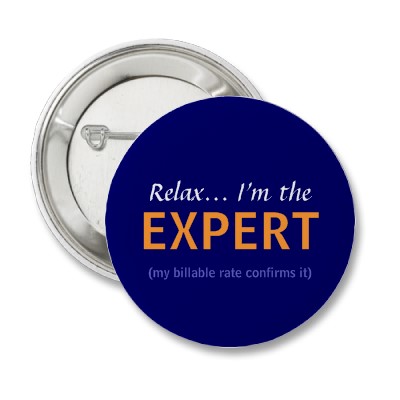Expert advice is a huge industry. Today, there is an endless supply of experts that promise to solve your problems in the most modern, elegant way possible. Many experts have their clients best interests at heart and work to solve their problems as they appear. Unfortunately, there are experts out there that view their clients as experimental subjects, using them to conduct research. This research doesn’t necessarily align with their clients’ best interest. If you are unlucky enough to hire this type of expert, you are in for an expensive life lesson. On the other hand, the right expertise can be the best investment you ever make. How you can you get the most from your expert?
Here’s how I learned my lesson the hard way. Back in my days at the pulp mill, we had a change in personnel in the bleach plant (the bleach plant turns wood pulp from brown, like grocery bags, to white, like photocopy paper). The new people were technically capable, but new to this technology. Queue our expert from head office. This guy promised that we could save $5 per tonne of pulp (about $1.5 million per year) if we adopted his bleach recipe. He guaranteed the same brightness (degree of whiteness of the pulp) as what we were running. Saving money while keeping customers happy looked to be a great combination. This seemed like a no-brainer. After we took his advice, we found out it wasn’t that simple. First, the fact that this expert didn’t step foot in our mill for the previous five years should have been a red flag. Second, the bleach plant operators openly protested the new recipe. To defend the expert and our decision, we could rationalize that the old management and the operators were fearful of change. That wasn’t the case. So, how did we do?
The results of the change were mixed. We achieved the cost savings and the brightness targets. However, the change was a disaster. This was because the 10,000 tonnes of pulp we made was too dirty to be sold at any price. For those of you keeping score, the sales price of pulp was about $700 per tonne. When faced with this inconvenient fact, the expert told us that bleaching wasn’t the same thing as cleaning pulp. In other words, he was responsible for the savings but was not responsible for the unsaleable pulp. He walked away and declared victory. We changed back to our old recipe, a little wiser from our experience. We later found out that he tried this same project years earlier and was banned from our site.
This is a sad story, but not unique. How can you avoid an expensive, frustrating experience when you hire an expert? Here’s how:
Before you hire the expert, ask for his client list. If he is as valuable as he claims, he should be happy to provide this.
- Make him define your problem and a method to solve it. This makes him think about a customized solution instead of one off the shelf.
- When you hire him, clearly set out expectations and measures for success. If the cure kills the patient, it isn’t acceptable.
- Don’t let your expert pat you on the head and lecture you. You paid for the service. He is your advisor, not your teacher.
- Don’t let him define success. The bad experts will take credit for benefits while ignoring the defects. The true measure is whether or not you are better off from your decision.
This might seem like a strange blog post from a business consultant. I make my living by being an expert. The reason is bad experts make it harder for me to help my clients. More importantly, giving bad advice is bad business. I expect anybody hiring me to hold me to these standards. If you hold your expert to them, you can achieve the results you are paying for.

Comments on this entry are closed.